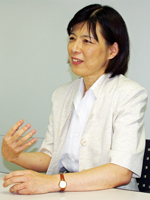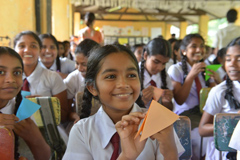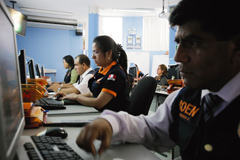InterviewJICA-RI Focus Vol. 35 - Interview with Deputy Director Nobuko Kayashima
2016.10.11
Conceptualizing JICA Projects from an Academic Point of View
In April 2016, Nobuko Kayashima, who had long been involved in JICA's educational development, became the first female deputy director of JICA Research Institute. We asked her about her thoughts on educational development, changes surrounding development assistance and the role of research activities in JICA Research Institute (JICA-RI).
Profile:
Nobuko Kayashima joined JICA in 1982. After working for the Training Affairs Department, the Operations Strategy Department, the Social Development Department, the Bangladesh Office, the Human Development Department and in other capacities, she assumed her current position in April 2016. Her research areas and interests are educational development in developing countries, international cooperation by universities and the internationalization of higher education.

- What changes are occurring around development assistance?
After working for years in this field, I feel a paradigm shift is occurring now. The Millennium Development Goals (MDGs), which were centered on the social sector, lasted 15 years until 2015. Then, those endeavors were said to have been insufficient, so the Sustainable Development Goals (SDGs), which incorporate the economic sector and environmental aspects, were adopted in 2015. The targets in the MDGs were supposed to be owned by developing countries, but the targets in the SDGs are supposed to be owned by not only developing countries but also developed countries. Because of the diversity of the developing world stemming from the growth of middle-income countries, common issues arose between the developed world and the developing world. It follows that, in the MDGs, these targets were set from only the developed countries’ point of views, but the SDGs targets were set from the mutual points of view between developed countries and developing countries.
Even in the field of educational development, when I started to work, I felt that I treated the issues in quite far countries, but nowadays I have come to realize that the issues we are tackling in development assistance have become similar to those we face in Japan.
In the education field, the internationalization of higher education has become indispensable. Universities are required to undertake many reforms, such as carrying out international joint research with other countries, training human resources who can be active in the international community, and contributing on global issues as a member of the international community.
The other day, it was reported that the University of Tokyo, which had been No. 1 until the previous year, fell to seventh in the rankings of Asian universities in Times Higher Education's 2016. Looking at these rankings in detail, universities in China, South Korea and Singapore are ranked relatively high, and the top universities in Malaysia and Thailand are found in the top 100. This suggests that one-sided teaching from Japan to developing countries based on the supposed superiority of Japanese research ability and academe does not work anymore.
Also, the number of other nationalities living in Japan, including Brazilians of Japanese descent, has been increasing, and the question of how to educate children whose mother tongue is not Japanese is becoming a big issue. The United States and United Kingdom have a long history of educating immigrant children and children from various ethnic groups, but it is a new issue for Japan. The issue of language and education has been discussed for a long time in developing countries, and it has become necessary for Japan to cope with the same issue. There may be many similar issues in the questions of how to educate Brazilian children of Japanese descent whose mother tongue is not Japanese and how to teach math when education is in French (also it is not the students’ mother tongue) in the first grade of elementary school in Niger.
So far Japan has had the solutions on educational development. For example, Japan has used its high quality math and science education expertise to conduct development assistance in developing countries. Now, however, when Japan sees its own situation, issues and problems are emerging with which developing countries may have more experience.
When I visited an elementary school in Sri Lanka, the children wore pure white uniforms. At the time my own children were also elementary school age, so my first impression was that keeping the uniforms white requires parents to wash it frequently, so it must be tough for parents. However, I could also imagine parents rejoicing at sending their children to school wearing a uniform. There is no difference between developing countries and Japan in the joy of being able to send your kids to school. The number of common educational issues both in developing countries and in Japan has gradually increased, and I think it is important to empathize with the feelings of people in developing countries.

Sri Lankan children in school uniform (Photo: JICA/Jiro Nakahara)
- What is your involvement with educational development?
I am researching how Japanese universities are involved in higher education development cooperation. What are the motivations for academics in Japanese universities to participate in JICA projects, what do they get out of them and what are the merits as universities' point of views? By finding the answers to these questions, I hope I will be able to suggest a better project scheme to let academics of universities participate in international cooperation projects and, as a result, we will be able to contribute to improving the quality of cooperation.
- What role does the JICA Research Institute play?
I think there are three roles.
One is to preserve the data and achievements of JICA projects in a form that can be used in academic activities. JICA can obtain a lot of materials utilized in analysis and investigation in development fields, so it is JICA-RI that is able to record and preserve them. Now JICA-RI has started a research project entitled "History of Japan's ODA," which analyzes how Japanese ODA policy and JICA activities have changed from the beginning to the present, and publication of it is planned. “Impact Evaluation Analyses for the JICA projects” is also another example.
The second is to disseminate information about JICA’s activities. For example, JICA-RI has published a "Project History" book series (non-academic, available only in Japanese) to allow a wide range of people to understand JICA-RI’s activities. As academic information, JICA-RI researchers write working papers.
The third role is to introduce information about debates and research projects in international academic fields within JICA in order to contribute to the formulation of JICA’s policy and the improvement of JICA’s operations in the field.
- What is JICA-RI's involvement in the SDGs and "Quality Growth?"
The SDGs were adopted in 2015 with goals both in developed and developing countries that incorporate the economic sector and environmental aspects. Japan's new “Development Cooperation Charter” decided by the Cabinet was launched the same year, and it also contains "growth" as a keyword. It refers not just to ordinary growth, but to "quality growth" that takes into consideration the problems of inclusiveness, resilience and sustainability.
However, it seems that these key words are not new for JICA. "Inclusive & Dynamic Development" is a JICA’s Vision and JICA has always focused on both the social sector and the economic sector. In this context, I think what JICA-RI should do is to explain JICA's activities using such concepts as the SDGs and "quality growth." In other words, JICA-RI should connect JICA's activities to these kinds of concepts, and should investigate through an academic lens if there is any shortfall in meeting these concepts in JICA’s activities.

Japan provided support to Peru's National Emergency Operations Center
(Photo: JICA/Kosuke Okahara)
If you take the example of “resilience,” JICA has many accomplishments with regard to disaster risk reduction. However, disasters are not the only external shocks. There also are conflicts and economic crises. As this example shows, it is important to reveal JICA’s strong points and weak points and fields of greater or lesser experience. This can lead to ideas about what JICA should do next.
Gender in research and work
JICA is highly aware of the need to make better use of women and allow them to play an active role. The number of female directors and executives has been increasing. Nevertheless, I have a feeling an ethos of allowing women to work actively has existed in JICA for quite a while. I have been able to work in JICA without any inconvenience as a woman.
Some women may feel they fall behind their work compared with colleagues or are not able to do what they need to do, when they have children. But such situations don't last forever. Some men also have to leave temporarily because of their health problems or to care for their elderly parents. I think it is important for an organization to allow a variety of working styles. When I myself gave birth to two children, I came back to the office after 10 months for the first and five months for the second, and could take relatively long hours for caring for my children with flexible work styles such as a reduced working schedule or fewer business trips. I am truly grateful for the support I have gotten in JICA.
When I became aware of something from women’s point of view, I would inform JICA about it. If only the person concerned can understand the issues, it is also only women who can understand women's issues. I don’t think so. I believe it is not only for the handicapped but also the non-handicapped to tackle disability issues, for instance. As such, I think it is important to have the sensibility of understanding and empathizing with others.

事業事前評価表(地球規模課題対応国際科学技術協力(SATREPS)).国際協力機構 地球環境部 . 防災第一チーム. 1.案件名.国 名: フィリピン共和国.

事業事前評価表(地球規模課題対応国際科学技術協力(SATREPS)).国際協力機構 地球環境部 . 防災第一チーム. 1.案件名.国 名: フィリピン共和国.

事業事前評価表(地球規模課題対応国際科学技術協力(SATREPS)).国際協力機構 地球環境部 . 防災第一チーム. 1.案件名.国 名: フィリピン共和国.

事業事前評価表(地球規模課題対応国際科学技術協力(SATREPS)).国際協力機構 地球環境部 . 防災第一チーム. 1.案件名.国 名: フィリピン共和国.

事業事前評価表(地球規模課題対応国際科学技術協力(SATREPS)).国際協力機構 地球環境部 . 防災第一チーム. 1.案件名.国 名: フィリピン共和国.
scroll